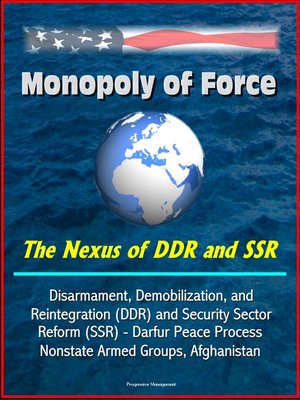Monopoly of Force
ebook ∣ The Nexus of DDR and SSR--Disarmament, Demobilization, and Reintegration (DDR) and Security Sector Reform (SSR)--Darfur Peace Process, Nonstate Armed Groups, Afghanistan
By Progressive Management

Sign up to save your library
With an OverDrive account, you can save your favorite libraries for at-a-glance information about availability. Find out more about OverDrive accounts.
Find this title in Libby, the library reading app by OverDrive.



Search for a digital library with this title
Title found at these libraries:
| Library Name | Distance |
|---|---|
| Loading... |
Professionally converted for accurate flowing-text e-book format reproduction, this report thoroughly examines Disarmament, Demobilization, and Reintegration (DDR) and Security Sector Reform (SSR), which have emerged in recent years as promising though generally poorly understood mechanisms for consolidating stability and reasserting state sovereignty after conflict. Despite the considerable experience acquired by the international community, the critical interrelationship between DDR and SSR and the ability to use these mechanisms with consistent success remain less than optimally developed. The chapters in this book reflect a diversity of field experience and research in DDR and SSR, which suggest that these are complex and interrelated systems, with underlying political attributes. Successful application of DDR and SSR requires the setting aside of preconceived assumptions or formulas, and should be viewed flexibly to restore to the state the monopoly of force.
Introduction * The State and the Use of Force: Monopoly and Legitimacy * Part I * The Politics of Disarmament and Security Sector Reform * Chapter 1 * Nonstate Armed Groups and the Politics of Postwar Security Governance * Chapter 2 * The Relationship Between SSR and DDR: Impediments to Comprehensive Planning in Military Operations * Chapter 3 * Drafting in Doha: An Assessment of the Darfur Peace Process and Ceasefire Agreements * Part II * Challenges of Reintegration * Chapter 4 * Military Integration and War Termination * Chapter 5 * Allies and Assets: Strengthening DDR and SSR Through Women's Inclusion * Chapter 6 * Understanding "Reintegration" within Postconflict Peace-building: Making the Case for "Reinsertion" First and Better Linkages Thereafter * Chapter 7 * The Disarmament, Demobilization, and Reintegration of Former Child Soldiers * Chapter 8 * Consequences of the Forgotten (or Missing) R * Part III * Managing DDR and SSR Programs * Chapter 9 * Action Amid Chaos: The Ground Truth Imperatives of DDRR and Security * Chapter 10 * Managing DDR and SSR Programs in the Philippines * Chapter 11 * Managing DDR Risks in Sudan: A Field Perspective * Part IV * The Monopoly of Force * Chapter 12 * There's a New Sheriff in Town: DDR-SSR and the Monopoly of Force * Chapter 13 * The DDR-SSR Nexus * Chapter 14 * Afghanistan and the DDR-SSR Nexus * Chapter 15 * Monopoly, Legitimacy, Force: DDR-SSR Liberia * Appendix * DDR and SSR Based on UN Integrated DDR Standards
All wars come to an end. Using all means possible, we attempt to end wars as quickly as possible and on the best possible footing for fostering stabilization and preventing (or at least discouraging) additional conflict. Successful disarmament, demobilization, and reintegration (DDR) are fundamental to enduring and equitable peace. For Afghanistan, the Bonn Conference established them as elements of success. DDR must be taken seriously if military or operational success is to gain strategic outcomes favorable to international order and American interests. Our security sector must embrace this thesis because there will most certainly be a next time, and we need to be ready to disarm, demobilize, and reintegrate combatants to achieve a stable environment for the establishment of economic prosperity and good governance.
DDR is not necessarily solely or even primarily a military effort. Once diplomacy or military force and persuasion have achieved adequate levels of security, a catalyst is required to focus effort and to create a DDR capability. Many actors could possibly play either leading or supporting functions in DDR. Organizations such as the United Nations (UN), the European Union (EU), and the World Bank potentially have parts...







